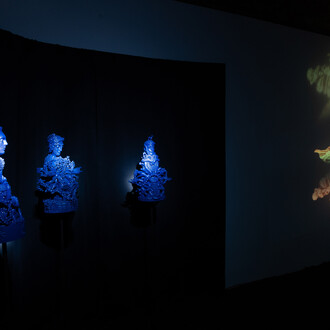Feminism continues to face both explicit rejection (“we’re all equal already”) and structural obstacles. In many respects the objective of the struggle of the second wave is still yet to be achieved. The female voice remains marginalised in key positions, the female body is subjected to surveillance, reproductive rights are restricted and care is overlooked as something self-evident. Emotions are disparaged, vulnerability mistaken for weakness.
“Woman must write her self: must write about women and bring women to writing, from which they have been driven away...” wrote Hélène Cixous in her text The laugh of the Medusa from 1975.
The exhibition Echoes of the Medusa presents a curated selection of audiovisual works by artists from Central and Eastern Europe, who use the medium of video to articulate bodily experience, sensitivity and a voice that has been repeatedly suppressed, mocked or demonised throughout the course of history. The works presented follow on from the concept of écriture féminine (feminine writing) as it was formed within the French thought of the 1970s. Instead of accentuating objectifying distance or a traditional narrative, here physicality, emotive force and subjective, frequently bruising experience come to the forefront. This approach cannot be limited only to literature, but resonates also in contemporary visual formats.
The authors of the videos articulate their stances, as well as their pains and joys, not through a description or commentary but rather by means of image, gesture, repetition or irony. Their bodies become bearers of memory and instruments of resistance. The camera here functions not as a mere device for recording, but as an active participant in a dialogue with oneself, with the expectations of society and one’s own family history.
The artists repeatedly return to motifs that have historically been instrumentalised against the female subject such as flowers, home, motherhood and sexuality. However, in the hands of the artists these symbols become instruments of transformation, appropriation or destruction. The Medusa here appears not only as a literary metaphor, but also as reference to a misunderstood mythical figure with an ambiguous legacy as an embodiment of horror and power, which can both paralyse and liberate with her gaze alone. Her laughter is an act of revolt, an explosion that disrupts norms and opens up a space for an autonomous female voice. A voice that does not fear to laugh, scream or remain silent – of its own volition.
Like Hélène Cixous, whose text provided the initial inspiration, we regard subjectivity as multilayered and mutable. In her exhortation to write “her self” Cixous at the same time disrupts the notion of the uniform female subject. She speaks of bisexuality not as a sexual orientation but rather as an internal multiplicity, a dual expression open to a variety of voices and experiences. This approach can be conceived as a forerunner of today’s non-binary thought, which rejects fixed identity. Creativity here is not the result of adaptation, but a flow which is shared, versatile and open.
The exhibition does not only present a collection of videos, but also formulates a collective call for female expression which refuses to be shaped by external demands. The selection of works was created through the eyes of the generation born in the 1990s. Personal and generational experience thus naturally forms a sensitivity to themes of identity, physicality and social norms. The curatorial selection here reflects not only aesthetic and political preferences, but also the means by which female bodies and voices were represented during the time when this generation was in its adolescence.
Each of the artists brings her own Laugh of the Medusa. A laugh that is not mockery but rather a return of a voice, a language and a perspective. It is a gesture of liberation, not attack. It does not intend to induce fear, but calls for attentive listening.














